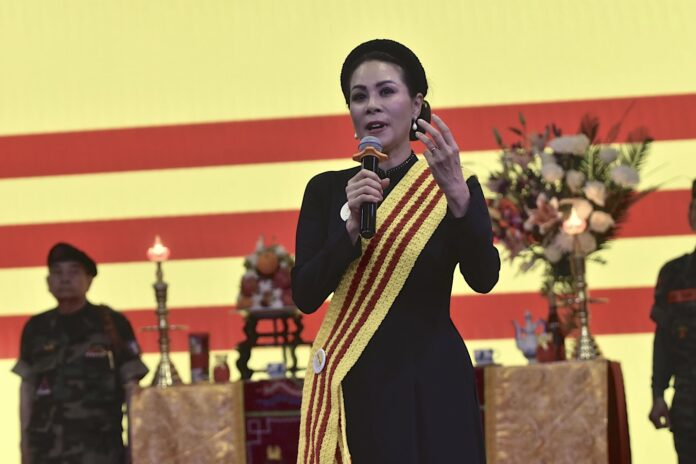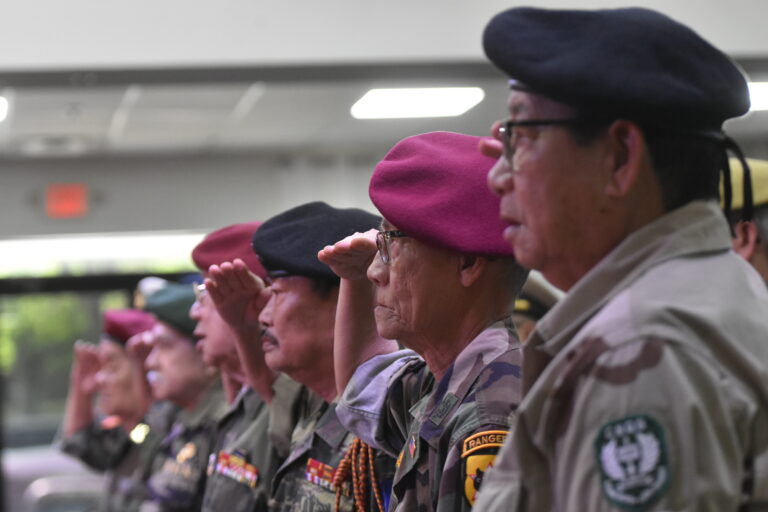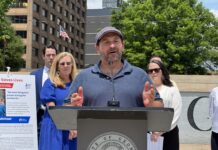
ATLANTA (Georgia Recorder) — Dozens of Vietnamese Americans gathered at a senior center in Norcross Wednesday to mark the 50th anniversary of what Von Tran called a dark day in history.
“It’s a day of suffering, of separations of family, of death, of thousands and hundreds of thousands killed and forced into reeducation camps and imprisoned, Holocaust-style, if you can imagine that,” said Tran, CEO of First Senior Center of Georgia, which hosted the event. “Some were imprisoned for five years, 10 years, 20 years, 30 years, trying to brainwash them into communist ideology.”
In Vietnam, April 30, 1975, is celebrated as Reunification Day, when North Vietnamese troops captured Saigon, the capital of South Vietnam, uniting the nation under socialist rule. But to members of the Vietnamese diaspora who fled South Vietnam after its fall, April 30 is marked as the Fall of Saigon, a day to lament the end of South Vietnam and to remember the people who died fighting for the nation.

Tran is part of that diaspora. She left Vietnam in 1983 at 9 years old, packed on a fishing boat with more than 60 others, including her parents and five siblings.
Tran said her family often relied on charity to make sure everyone was fed during her early days in the U.S.
“I went to the food pantry at the church every Sunday, six of us, to get six chickens so my mother would be able to cook for us, because my father in 1985 was only making $3.54 an hour,” she said. “He couldn’t feed seven mouths. I jokingly say all the time, that I’ve been converted so many times at church pantries, from Catholic to Lutheran to Methodist to, you name it, just for a chicken.”
Thanks to those charity chickens and a lot of hard work, Tran found success in the business world and now runs her own food pantry out of the senior center, delivering literal tons of food to thousands of households every week, with a special focus on seniors.
In addition to the food bank and recreational facilities, the center has areas for arts and crafts as well as medical services, including acupuncture. While the ceremony honoring the fall of Saigon took place, a few old timers sat in the back and played board games like xiangqi, or Chinese chess.
Many of the people who fled Vietnam around the fall of Saigon are getting older, and the center helps with tasks like translation, transportation and signing up for government assistance programs.
“A lot of them are low-income, so we cater to those who don’t have the means to – whether because of a language barrier or transportation limitations – take them to doctor appointments, schedule a doctor appointment for them, apply for all the different social services, food stamps, Medicaid, Medicare, and translation, interpretation. We also give them coffins. We bury them, give them a cemetery plot. We cremate them. These are all free services.”
Many of the people who came out Wednesday were members of South Vietnam’s military, including some who wore their old uniforms. They saluted the flag of South Vietnam and delivered speeches and sang songs in Vietnamese. Members carrying battery-powered candles walked to the front of the center’s common area and placed them on a large map of Vietnam.
Tom Nguyen, a retired mechanical engineer, served six years in the South Vietnamese Navy, but he came to the ceremony in a suit and tie instead of his fatigues.
“I’m glad the war is over,” he said. “I’m glad that the future is growing better over there and over here, because I was there to see many people killed. There’s no reason for that. I hate war. I hate war. It just destroys things and communities and the economy.”

Nguyen has lived in the U.S. since 1975 and Georgia since 1978. Every now and then when he speaks, a little bit of a southern drawl rises up from beneath his Vietnamese accent. If you ask him about it, he’ll smile and pull down the collar of his shirt.
“Can’t you see my neck is red?” he says with a laugh.
Nguyen may not be American by birth, but he’s a red-blooded patriot. He said he wants the next generation of Vietnamese Georgians to honor their roots but also appreciate their new country.
“We’re trying to tell them today is a better life for you, especially you here in America, you have a better future, you have a long life, and you have education, you can perform, and you can achieve as you wish, because here is opportunity for everybody, America is number one, I put it that way,” he said.
Hanh Kim Dang, a realtor and past president of Vietnamese Community of Georgia, said she’s also thinking about the next generation. She got out of Vietnam April 26, 1975, just days before the fall of Saigon.
She says she counts herself lucky that she and her sister were able to fly out of Vietnam because her aunt worked for the U.S. government. Many others made a perilous trip by boat or on foot.
Dang, who was 20, had studied some English in school, but she was far from fluent.
“It was very rough,” she said. “I was in the third year of law school, then I went back here and started all over again. I tried to go to high school because that’s where I thought I could learn English and use it more to get better. But they said, no, your age, you have to go to community college.”
Dang turned that community college education into a degree in information and computer science from Georgia Tech. After a 19-year career, she entered the business world and now owns several nail salons and food courts.
Dang’s three children are all in their thirties now. They’re all conversational in Vietnamese, if not fluent.
“When they were growing up, I hired nannies who were Vietnamese, and I told them, please use Vietnamese language at home, so they pick it up, so they can save it, but it’s more like daily conversation, not writing, not literature,” she said.
“They have some understanding of why we’re here, but understanding deeply the reason why we sacrificed, we left everything behind, it’s hard for them because they’re born here,” she added. “They adopted the culture, language, everything here, but they do understand, they see what the people have been through through photos, videos, movies.”







